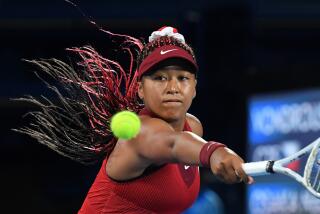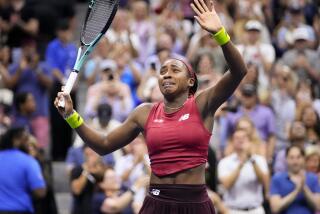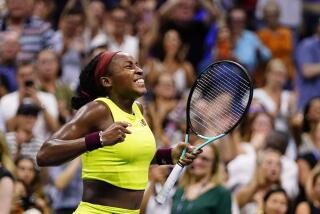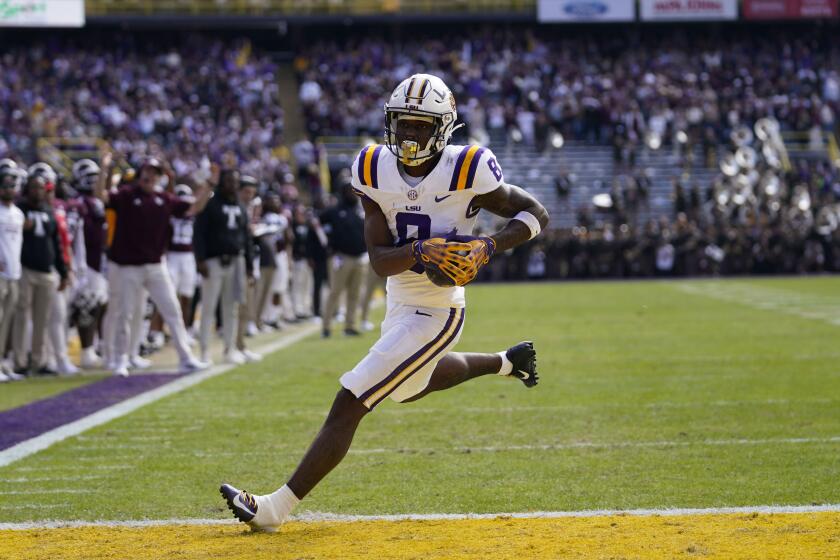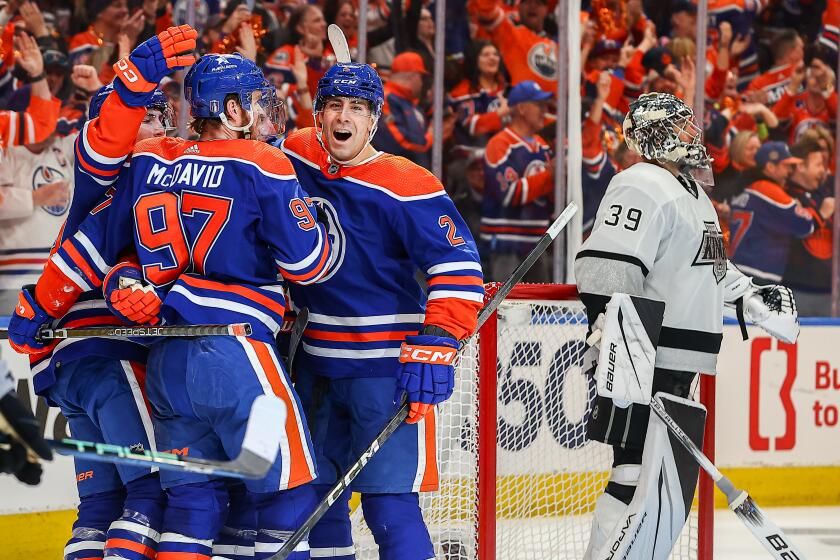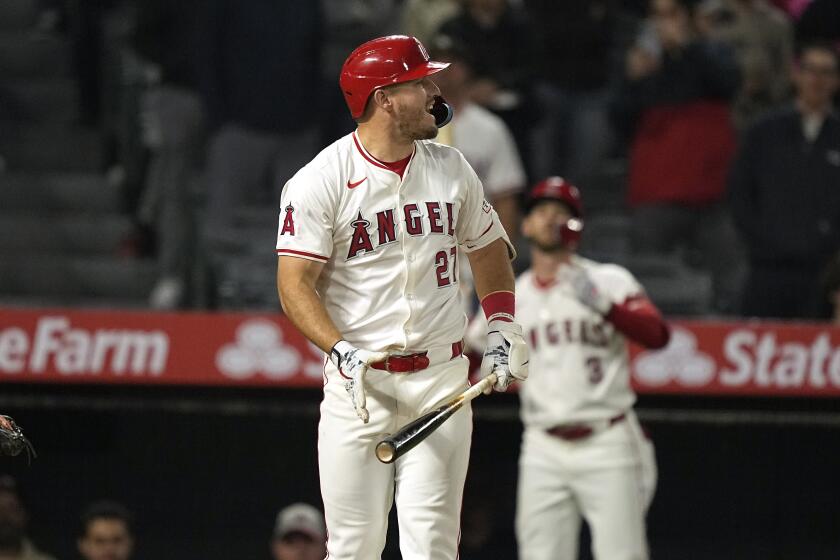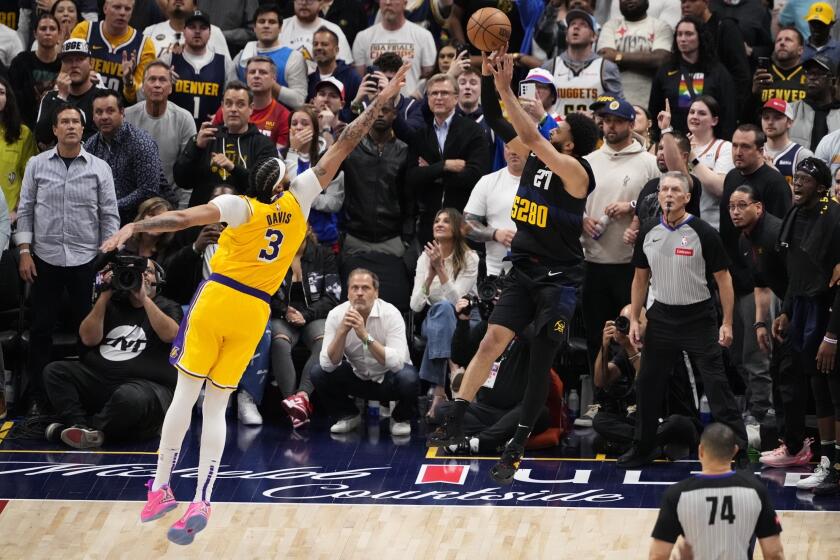Column: Naomi Osaka advances to U.S. Open semifinals, her first in a Grand Slam event
Sascha Bajin’s first impression of Naomi Osaka was decidedly negative. Bajin, then Caroline Wozniacki’s hitting partner, had seen Osaka play against and practice with Wozniacki but couldn’t get a good read on the hard-hitting kid with the wild mass of curly hair. Osaka wouldn’t make eye contact with him or anyone else and usually kept her head down.
Bajin didn’t understand why.
“I thought she was a little bit more of a diva because she didn’t talk much,” said Bajin, a former low-level tournament player who spent eight years as Serena Williams’ hitting coach.
What Bajin assumed was arrogance actually is a charming shyness, as he learned when he became Osaka’s hitting partner late last year.
Born in Japan to a Japanese mother and Haitian father and brought up in New York and Florida, Osaka is a mashup of many cultures yet uniquely herself.
Bajin’s job isn’t to change who she is or to teach her how to play tennis. His mission is to enhance her considerable talents and guide her away from the self-criticism that splintered her focus on the court. After quickly realizing how wrong his initial judgment was, he has helped Osaka reach new heights.
The 20-year-old advanced to the first Grand Slam semifinal of her career with a 6-1, 6-1 demolition of Ukraine’s Lesia Tsurenko on Wednesday at Arthur Ashe Stadium, losing only three points on her serve in the first set and four in the second while spending 57 minutes on the court. It was her third sub-one-hour match at this sweat-soaked U.S. Open.
Excluding her entertaining three-set win over Aryna Sabalenka in the fourth round, Osaka has lost only 13 games at a place that has felt magical to her since she visited as a kid.
“It definitely means a lot for me,” she said, “and I always thought if I were to win a Grand Slam, the first one I’d want to win is the U.S. Open because I have grown up here and then my grandparents can come and watch. I think it would be really cool.”
Osaka’s semifinal opponent Thursday will be 2017 U.S. Open runner-up Madison Keys, who methodically defeated Carla Suarez Navarro, 6-4, 6-3. The 23-year-old American has a 2-0 career edge over Osaka, including erasing a 1-5, third-set deficit in the third round here two years ago.
“I think it will be a completely different match,” Keys said. “And she’s grown a lot since then, as have I, so I think it’s going to be a tough match and I don’t think that’s going to be on her mind.”
Osaka made a breakthrough in March when she won the title at Indian Wells, where her victims included Maria Sharapova, Karolina Pliskova, and Simona Halep. She later slumped and came here ranked No. 20, three spots from the career-best No. 17 she’d reached in July.
Bajin changed his motivational tactics leading up to the U.S. Open, telling her to focus on the small picture of each shot and rally instead of focusing on big-picture results.
“As long as she just competes and focuses on herself, then the score is going to be all right, and that’s secondary for me,” he said.
She has listened. She cried after she defeated Sabalenka but was calm and low-key after she eased past Tsurenko.
“Now I feel like it’s sort of like business again,” Osaka said. “Quarters was my mental goal every time I played a Grand Slam. And then after I went into the quarters I kind of want to keep going, so I feel like I have to be focused again and keep trying really hard.”
Osaka is finding a balance between being a fierce competitor and preserving her almost childlike sweetness.
“I think everybody in this room and on this planet can learn a lot from that girl in order to maintain that innocence,” Bajin said.
He wishes she weren’t so open about her emotions while speaking with the media, but Keys enjoys getting insight that way.
“She always has some pretty funny interviews, so I always look forward to seeing what she’s saying in her interviews,” Keys said, smiling.
Having worked with Williams and Osaka, Bajin is often asked to compare them.
“The only similarity they have is that they kind of have the same big hair,” he said. Williams, he added, “is more of a boss than Naomi is now. I’m working very hard, and we all are in the team, to make sure that Naomi one day might own the court like Serena.”
That day might arrive soon. But Keys, in the semifinals for the third time in her last five Grand Slam events, has a timetable and a dream too.
“I think I’ve gotten a lot better managing my emotions once it gets to this part and knowing that everything is going to be probably more amped up, and not shying away from those but just really being honest about it and talking about it,” Keys said. “Just embracing the moment. Just trying to remind myself to actually have fun and enjoy the experience.”
Follow Helene Elliott on Twitter @helenenothelen
More to Read
Get our high school sports newsletter
Prep Rally is devoted to the SoCal high school sports experience, bringing you scores, stories and a behind-the-scenes look at what makes prep sports so popular.
You may occasionally receive promotional content from the Los Angeles Times.
